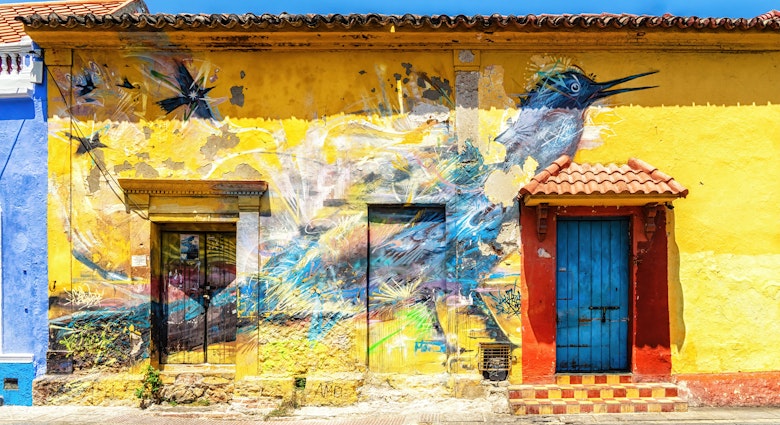

Sunset falls on Cartagena, Colombia. Starcevic / Getty Images
Where can you go where the skies are so blue and cloudless that they look permanently polarized? Where you’ll find a breezy, laid-back ambience as tourists and locals alike explore historic buildings at a gentle flip-flopped pace? Look no further than the Colombian city of Cartagena de Indias, one of the most popular tourist destinations in the country.
Cartagena’s colorful history and dramatic setting on the South American shores of the Caribbean have made it very attractive to both local and international travelers. Despite the city’s colonial roots, this is no museum, either – it’s a living, breathing place. Seafood restaurants where the dress code is beachwear? Check. Cool DJ bars atop historic fortresses? Check. Authentic salsa joints, with bands playing like they won’t get paid unless the crowd dances? Check. From its history, to its food and nightlife, to its beaches, Cartagena’s got it all.

Love at first site
Step through , a clock tower passageway through Las Murallas, the 400-year stone walls that surround the city, and you arrive at Cartagena’s historic heart, the. The narrow and winding streets, with their bougainvillea-strewn, pastel-painted balconies, create a glorious sense of suspended time. Grab a cooling agua de coco (coconut water) from any one of a hundred strolling vendors if the heat gets too much, and simply stroll the shaded narrow streets.
Cartagena was founded in 1533 by Spanish explorer and gold plunderer Pedro De Heredia, and the town soon became the storehouse for all the gold and other resources the conquerors stole from the continent. This made it an attractive prospect for pirates and other thieves, and it was to fend off their advances that the town’s fortified walls were built in the 17th century. In this vein, the impressive overlooks the city and the bay and is considered by some to be the most impregnable fort the Spanish ever built.

In Plaza De Los Coches, you can take a sightseeing tour to delve into the history of this triangular plaza lined with old balconied houses and colonial arches. Just around the corner, you’ll find the 17th century Iglesia de San Pedro Claver, one of the city’s many monumental, ornately baroque churches. Church visits anywhere in town are a must – especially at sundown when the doors open to the faithful for an evening service or wedding.
is a stunningly beautiful and compact square ringed with trees and two of the town's best museums and colonial houses. Here you’ll find , displaying hundreds of pre-Columbian artifacts, while just across the plaza there's the , a good example of late colonial architecture that today operates as a museum displaying Inquisitors’ instruments of torture, pre-Columbian pottery and historical objects from both colonial and independence times. Nearby is bordered by great restaurants and bars and a Botero sculpture, but for a smaller, quieter and less touristy option, check out Parque Fernadez De Madrid.
Just outside Cartagena’s Old City walls is łŇ±đłŮ˛ő±đłľ˛ą˛ÔĂ, a former slave quarter which is now one of Cartagena’s trendiest barrios. Highlights include exploring the colorful, ever-growing collection of urban street art on the famous Calle La Sierpe.
Food and nightlife
If you really want to escape the pastel-toned perfection and see how the locals live, swap your sandals for something sturdier and take a 10-minute taxi ride to . Here, you'll find a chaotic local market with blaring music, raucous sales patter, charcoal-makers seemingly teleported in from the Middle Ages, and street food.
For night-time action, head to łŇ±đłŮ˛ő±đłľ˛ą˛ÔĂ where you’ll find dozens of cafes, bars and restaurants, including the highly popular Bazurto Social Club. The playlist consists mainly of Afro-type beats, particularly champeta – an African-influenced music and dance style that arose from Cartagena’s poorest neighborhoods. A block away, CafĂ© Havana mixes the meanest mojitos in town, but the prize for best location goes to, where you’ll want to dress to impress as you sip your sundown cocktail atop the Old City walls and enjoy the Caribbean views and breezes. Meanwhile, salsa bar Donde Fidel has some of the best seats in town right on Portal De Los Dulces, a plaza overlooking a scene straight out of Gabriel GarcĂa Márquez’s romantic novel, Love in the Time of Cholera. Here, locals sell grated coconut treats baked with panela, raw cane sugar.

Blissed-out beaches
For beaches, the closest options are at Bocagrande, a mini Miami just a few kilometers southwest of the city centre. A better choice is to head to the crystalline, turquoise waters and white sand of the Islas del Rosario, an archipelago consisting of 27 small coral islands surrounded by coral reefs. If you have some time – plan on an excursion. You’re just four hours away from sister city and the world-class beaches of, where the jungle edges up to a sea that’s bordered by the snow-capped Sierra Nevada de Santa Marta. Now, where’s your passport?
Mike Power traveled to Cartagena with support from jetBlue. ŔĎ°ÄĂĹÁůşĎ˛ĘżŞ˝±ĽÇÂĽ contributors do not accept freebies in exchange for positive coverage.
This article was updated in June 2018 by Jacqui de Klerk.
Explore related stories





 Wildlife & NaturePicture yourself in Colombia with Elsewhere by ŔĎ°ÄĂĹÁůşĎ˛ĘżŞ˝±ĽÇÂĽ
Wildlife & NaturePicture yourself in Colombia with Elsewhere by ŔĎ°ÄĂĹÁůşĎ˛ĘżŞ˝±ĽÇÂĽFeb 22, 2023 • 6 min read

 CampingReturn to nature in the magical hills of the Sierra Nevada, Colombia
CampingReturn to nature in the magical hills of the Sierra Nevada, ColombiaAug 8, 2022 • 5 min read

 Wildlife & NatureExploring Punta Gallinas, Colombia's untouched Caribbean desert
Wildlife & NatureExploring Punta Gallinas, Colombia's untouched Caribbean desertMar 10, 2020 • 5 min read
